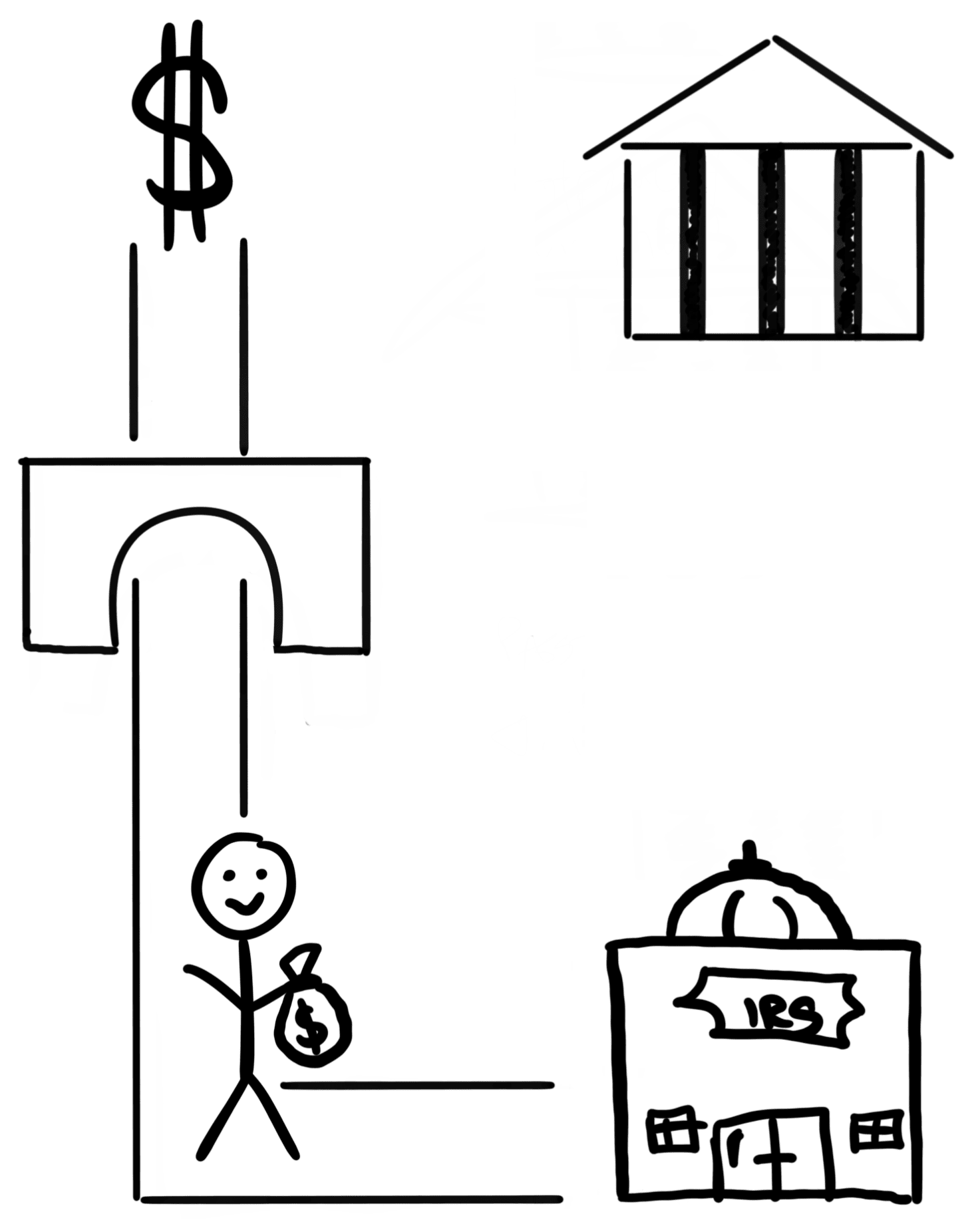Deal alert! Northwest will form your LLC for $39 (60% discount). See details.
 After you start a South Dakota LLC, there are two main types of ongoing filings. The first is the Annual Report with the state, and the other is taxes.
After you start a South Dakota LLC, there are two main types of ongoing filings. The first is the Annual Report with the state, and the other is taxes.
Paying taxes is an important part of running a business, but figuring out which taxes you need to pay can be a pain.
This lesson will provide you with general resources and the basics of South Dakota LLC tax filing requirements.
What taxes does a Limited Liability Company pay in South Dakota?
Each LLC has a different tax situation, so the taxes paid for a South Dakota LLC varies.

The amount of taxes owed for your LLC depends on rules like:
- how your LLC is taxed
- state and local tax rules
- any sales and use tax requirements, or
- whether you have employees
Additionally, some business types are required to register for industry-specific taxes.
Pro Tip: We recommend hiring an accountant to ensure your LLC meets all of its tax obligations.
We also recommend getting an EIN Number for your LLC. An EIN is also called a Federal Tax Identification Number. They mean the same thing.
Not only will an EIN number be used to open an LLC bank account, but it will also be used for filing taxes with the local, state, and federal governments.
LLC pass-through taxation (Who pays the taxes?)
By default, LLCs don’t pay taxes.
 Instead, the LLC Members are responsible for reporting the income (or losses) on their personal 1040 tax return. The Members pay taxes on any LLC profits. This is because of LLC pass-through taxation.
Instead, the LLC Members are responsible for reporting the income (or losses) on their personal 1040 tax return. The Members pay taxes on any LLC profits. This is because of LLC pass-through taxation.
Simply put, pass-through taxation means the responsibility for reporting tax information from an LLC “passes through” the LLC to the LLC Members.
How are LLCs taxed in South Dakota?
By default, a South Dakota LLC is taxed by the Internal Revenue Service (IRS) based on the number of Members the LLC has. Then the South Dakota Department of Revenue honors this and taxes your LLC the same way at the state level.
An LLC with 1 owner (Single-Member LLC) is taxed like a Sole Proprietorship.
An LLC with 2 or more owners (Multi-Member LLC) is taxed like a Partnership.
The above are referred to as the “default status“. Meaning, they are automatically applied based on the number of LLC Members.
Alternatively, you have the option of requesting an “elective status” for your LLC. This is done by filing an extra form with the IRS. Once granted, this elective status means the IRS will treat your LLC as a Corporation (either an S-Corporation or C-Corporation) for tax purposes.
Note: Your South Dakota LLC Operating Agreement should also include information about how your LLC is taxed.
Federal Income Taxes
There are several different options for how the IRS can treat your LLC for tax purposes.
Single-Member LLC taxes (default status)
The IRS treats all Single-Member LLCs as Disregarded Entities for tax purposes. This just means that the IRS doesn’t expect the LLC to file its own federal income tax return.
Instead, the owner of the Single-Member LLC files the return (and pays the federal income taxes).
How the LLC pays federal income tax is determined by who owns the LLC:
- If the LLC is owned by an individual, the LLC is taxed like a Sole Proprietorship.
- If the LLC is owned by another company, the LLC is taxed as a branch/division of the parent company.
Multi-Member LLC taxes (default status)
If an LLC has two or more owners, the LLC is taxed like a Partnership.
The LLC needs to file a 1065 Partnership Return and issue a Schedule K-1 to the LLC owners.
The K-1s report each owner’s distributive share of profits. And the K-1 income “flows through” to the owners. The income taxes are then paid by each owner on their personal income tax return (Form 1040).
Husband and Wife LLC taxes
You may have heard that in some states, a husband and wife LLC has the option to file taxes as a Single-Member LLC (aka Qualified Joint Venture) instead of a Multi-Member LLC.
This is true for community property states (like Texas). That said, South Dakota isn’t a community property state, which means Qualified Joint Ventures are not available in this state.
Electing to have your LLC taxed as a Corporation
Instead of the default statuses above, a Limited Liability Company (LLC) can be taxed like a Corporation.
Note: We recommend speaking with an accountant before making a corporate election.
There are two types of corporate elections:
- S-Corporation
- C-Corporation
LLC taxed as an S-Corporation (elective status)
By filing Form 2553 with the IRS, your LLC can request to be taxed like an S-Corporation.
Being taxed as an S-Corp can help businesses (with established profits) save money on self-employment taxes.
Tip: There are additional expenses to having your LLC taxed as an S-Corporation Most new business owners shouldn’t make this tax election until their business is established and revenue is consistent. Once there is at least $70,000 in annual net income per LLC Member, we recommend speaking to your accountant about this option.
LLC taxed as an C-Corporation (elective status)
By filing Form 8832 with the IRS, your LLC can request to be taxed like a C-Corporation.
Being taxed as a C-Corp can help large employers save money on healthcare fringe benefits.
Note: This election is not common. Most of our readers don’t choose to have their LLC taxed as a C-Corporation.
South Dakota State Income Tax for South Dakota LLCs
Good news! Unlike most states, South Dakota doesn’t have a state-level income tax. This means you don’t have to pay state income taxes.
That said, there are other types of South Dakota business tax that apply to certain industries and types of businesses.
We recommend hiring an accountant to prepare and file your taxes.
You can also contact the South Dakota Department of Revenue for more information about South Dakota state taxes.
Local Income Tax for South Dakota LLCs
You and/or your LLC may need to file and pay income taxes with your local municipality (town, city, county, etc.).
We recommend hiring an accountant to prepare and file your local income taxes.
You can also contact your municipality to check on their requirements.
South Dakota Sales Tax
If you sell products to consumers in South Dakota, you may need to collect sales tax and get a Seller’s Permit.
A Seller’s Permit is the license that allows you to collect sales tax on retail sales in the state where you do business. It’s sometimes also called a:
- resale license
- wholesale license
- sales tax permit/license
- reseller permit
They all mean the same thing and we may use these terms interchangeably.
You can get a Seller’s Permit online from the South Dakota Department of Revenue (DOR): Tax License Applications.
And you can read more information about South Dakota sales tax from these South Dakota DOR resources:
For more information on permits, read South Dakota Business Licenses and Permits.
And if you have any questions about whether you need a Seller’s Permit, you can contact the South Dakota Department of Revenue at 1-800-829-9188. Their hours are Monday through Friday from 8am to 5pm, Central Time.
Tip: Save time by hiring an expert. We recommend using TaxJar. They'll help you register for, collect, and pay sales tax.
South Dakota LLC Payroll Taxes
If your South Dakota LLC will have employees, you must submit payroll taxes. Payroll taxes are essentially a group of taxes and filings, including:
- Federal income tax withholding
- State income tax withholding
- Social Security tax
- Medicare tax
- Federal unemployment taxes (FUTA)
- State unemployment taxes (SUTA)
- Local/county deductions
- Employee deductions
As an employer in South Dakota, you need to set up payroll, withhold payroll taxes from employees’ paychecks, and then submit those filings and taxes to various state and government agencies.
Although you can file payroll taxes yourself, the calculations can be burdensome and very complex. And if done improperly can lead to penalties and fines. Most people hire a payroll company or ask their accountant for help.
Our favorite payroll company is Gusto Payroll. They’ll automate and take care of your payroll taxes.
For more South Dakota payroll tax resources, please see the references section at the bottom of this page.
Managing your books & staying organized
You can keep track of income and expenses using Microsoft Excel or Google Sheets. Or you can use software to help automate things and save time.
The accounting software we recommend is Quickbooks Online.
Working with an accountant
As you can see, figuring out the different types of taxes you owe can be complicated, let alone how to properly fill out all the forms. And doing taxes improperly or missing deadlines can be harmful to your business
We strongly recommend working with an experienced accountant in South Dakota to help make sure you file your federal, state, and local taxes correctly.
Check out our list of accountant recommendations in all 50 states. We recommend phoning a few to see which one you feel most comfortable with, and who understands your business fully.
South Dakota Department of Revenue Contact Information
There are other types of South Dakota business tax that apply to certain industries and types of businesses.
You can contact the South Dakota Department of Revenue at 1-800-829-9188 for more information about South Dakota state taxes.
South Dakota LLC Taxes FAQs
Do I have to pay an annual fee for my LLC in South Dakota?
Yes, all South Dakota LLCs have to pay an annual fee by filing a South Dakota LLC Annual Report every year. This is separate from the federal, state, and local taxes that you pay.
The LLC Annual Report is filed with the South Dakota Secretary of State. It is not a tax paid to the South Dakota Department of Revenue.
The Annual Report for South Dakota LLCs costs $50 per year. This is paid every year for the life of your LLC.
How much is an LLC in South Dakota?
South Dakota LLC Costs include:
$150 to form your South Dakota LLC (to file your LLC Articles of Organization).
$50 in annual fees (to file your LLC Annual Report).
Do I need to file a South Dakota state tax return for my LLC?
No. Unlike most states, South Dakota doesn’t require you to file a state tax return.
How do I know my LLC tax classification?
You can tell your LLC’s tax classification by looking at how many Members are in your LLC.
This is because LLCs receive their tax classification from the IRS based on the number of Members (owners) your LLC has.
If you have one Member, your LLC is taxed as a Sole Proprietorship.
If your LLC has more than one Member, your LLC is taxed as a Partnership.
This is called being taxed in your default status. Meaning, you don’t have to file any paperwork to let the IRS know that’s how your LLC will be taxed because they tax LLCs that way by default.
However, in order for your LLC to be taxed as a Corporation, you or your accountant would have to file paperwork with the IRS letting them know you’ve chosen to be taxed as a Corporation.
And then the IRS would mail you an Approval Letter to confirm you’ve chosen the Corporate tax election for your LLC.
Note: Being taxed as a Corporation is rare for LLCs, so most people don’t need to worry about this.
And if you’re still unsure about how your LLC is taxed, we recommend calling your accountant or the IRS (1-800-829-4933). To speak to a live person at the IRS, press option 1, option 1 again, and then option 3.
How to start an LLC in South Dakota?
Here are the steps for starting an LLC in South Dakota:
- Choose an LLC name and make sure it’s available
- Choose who will be your South Dakota Registered Agent
- File the South Dakota LLC Articles of Organization
- Complete and sign an LLC Operating Agreement
- Get a Tax ID Number (EIN) from the IRS
- Open an LLC bank account
- Check whether you need a business or sales tax license in South Dakota
References
IRS: Tax Information for Businesses
South Dakota Department of Revenue: Tax Facts
South Dakota Department of Revenue: Businesses
South Dakota DLR: Reemployment Assistance for Businesses (RA Tax)

Matt holds a Bachelor's Degree in business from Drexel University with a concentration in business law. He performs extensive research and analysis to convert state laws into simple instructions anyone can follow to form their LLC - all for free! Read more about Matt Horwitz and LLC University.
South Dakota LLC Guide
Looking for an overview? See South Dakota LLC
